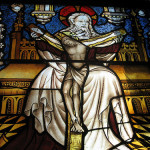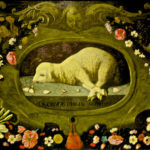We run our website the way we wished the whole internet worked: we provide high quality original content with no ads. We are funded solely by your direct support. Please consider supporting this project.

A Brief Theology of God’s Love
The most profound truth of the Bible is that “God is love” (1 John 4:8, 16). This is the most fundamental thing to be said about God, for it encompasses everything else that can be said about God. Peter Kreft explains this passage it this way:
Love is God’s essence. Nowhere else does Scripture express God’s essence in this way. Scripture says God is just and merciful, but it does not say that God is justice itself or mercy itself. It does say that God is love, not just a lover. Love is God’s very essence. Everything else is a manifestation of this essence to us, a relationship between this essence and us. This is the absolute; everything else is relative to it.
As Father, Son, and Holy Spirit, God eternally exists as perfect love. Each divine person within the godhead ascribes ultimate worth to the others. In doing this God is not being conceited but simply accurate. For as the one eternal uncreated reality, the triune community is the ultimate value, if you will, from which all created things derive value.
While we cannot clearly conceive of what the fellowship of the Father, Son, and Holy Spirit looked like prior to creation, we can discern its basic nature from the way God reveals himself to us in the person of Jesus Christ. In Christ, and throughout the New Testament, we learn that the fellowship of the three divine persons consists in mutual submission.
The triune fellowship is Christ-like. The Father, Son, and Holy Spirit ascribe ultimate worth to one another without any competition. Their eternal life together consists in the divine joy of expressing the absolute value each has for the other.
The essence of this triune love is revealed in God’s love for humanity. The eternal, other-oriented love of the Father, Son, and Holy Spirit is revealed outside of God, as it were, in his love for humanity. God’s own inherent worth is expressed in the worth he ascribes to humanity, and it is truly breathtaking.
God expresses unsurpassable love for us and ascribes unsurpassable worth to us by sacrificing the One who has unsurpassable value on our behalf! And this unfathomable expression of love to us displayed the perfect love that the three divine persons have for one another.
God is toward us as he eternally is within himself: God is love.
—Adapted from Repenting of Religion, pages 25-26
Image by Hannes Wolf via Unsplash
Category: General
Tags: God is Love, Love, Trinity
Related Reading

What Power Do You Trust?
Governments and nations have always relied on fighting to survive. They punish criminals who threaten their welfare. They go to war against enemies who attack their borders or stand in the way of their agenda. This is how the kingdoms of the world maintain law and order and advance their causes. By contrast, the Kingdom…

Was Jesus Abandoned by the Father on the Cross?
As Jesus hung on the cross, he cried, “Eli, Eli, lema sabachthani?” (Mt 27:46). This is the cry of our God who stooped to the furthest possible depths to experience his own antithesis, as the all-holy God becomes the sin of the world (2 Cor 5:21) and the perfectly united God becomes the curse of…

Sanctuary
. SantiMB . via Compfight Jamie Wright wrote this penetrating essay of encountering a woman in a moment of extremity and need. It’s a reminder of our great need for a sanctuary, a safe place to come when the world has gone mad and we have nowhere else to go. From her essay: Because,…

Featured Sermon Series: Scandalous Love
The Scandalous Love series is often considered one of Greg’s and Woodland Hill’s most foundational series. In fact, it was so important that it subsequently led to the Can’t Stop the Love series. Defining the true character of God is at the heart of what ReKnew is all about, so we wanted to host…

Christus Victor Atonement and Girard’s Scapegoat Theory
Many of the major criticisms of Crucifixion of the Warrior God that have been raised since it was published four weeks ago have come from folks who advocate Rene Girard’s understanding of the atonement. A major place where these matters are being discussed is here, and you are free to join. Now, I have to…
